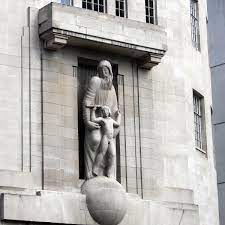- Not acting the part - 24th February 2026
- Death wish - 23rd February 2026
- Return to sender - 20th February 2026

It is rare in journalism that a story is repeated. Yet this prescription is necessary after The Sunday Times (ST) reviewed a book about whether the appalling past of a creative figure, negates the genius of his or her work. This came less than a week after The Eye had raised the same problem. Here, then, we re-publish our original story…

During 23 years with the BBC, and 39 years in journalism (when he was trained to use clear, simple language, avoiding jargon), revealing the truth about ‘important’ individuals has always been central for our Editor, Welshman Phil Parry, and after the controversial Coronation of one of the most significant of them, King Charles III, here he looks at why it’s now been shown that many have feet of clay.
Earlier he described how he was assisted in breaking into the South Wales Echo office car when he was a cub reporter, recalled his early career as a journalist, the importance of experience in the job, and made clear that the‘calls’ to emergency services as well as court cases are central to any media operation.
 He has also explored how poorly paid most journalism is when trainee reporters had to live in squalid flats, the vital role of expenses, and about one of his most important stories on the now-scrapped 53 year-old BBC Wales TV Current Affairs series, Week In Week Out (WIWO), which won an award even after it was axed, long after his career really took off.
He has also explored how poorly paid most journalism is when trainee reporters had to live in squalid flats, the vital role of expenses, and about one of his most important stories on the now-scrapped 53 year-old BBC Wales TV Current Affairs series, Week In Week Out (WIWO), which won an award even after it was axed, long after his career really took off.
Phil has explained too how crucial it is actually to speak to people, the virtue of speed as well as accuracy, why knowledge of ‘history’ is vital, how certain material was removed from TV Current Affairs programmes when secret cameras had to be used, and some of those he has interviewed.
He has disclosed as well why investigative journalism is needed now more than ever although others have different opinions, how the coronavirus (Covid-19) lockdowns played havoc with media schedules, and the importance of the hugely lower average age of some political leaders compared with when he started reporting.

It’s important to know the truth about influential figures, so that people can then decide whether they deserve support or not.
This has always been critical for me, and it is up to the type of journalism that I pursue, to reveal facts which may be unwelcome to some.
It is patronising in the extreme (not to mention VERY dangerous) to assume that individuals cannot be trusted knowing ALL the background to figures who have influence over daily lives, because backing might not then be forthcoming.


A case in point, with a strong Welsh link (who has been very much in the news), is the gifted children’s author Roald Dahl.
A huge row developed over plans to remove references to aspects of characters’ appearance and weight, with words like ‘fat’ and ‘ugly’ to be taken out, because they were deemed not suitable for modern audiences.

There was, however, a fierce backlash against the idea and his books were to be printed in their original form.
But Mr Dahl possessed even worse flaws, placing a large question mark over a public plaza in the heart of Cardiff Bay, being named Roald Dahl Plass.
He was a convinced anti-Semite, and although he was a brilliant writer, honouring him seems bizarre.
 In 1983 he had told the New Statesman: “There is a trait in the Jewish character that does provoke animosity, maybe it’s a kind of lack of generosity towards non-Jews. I mean, there’s always a reason why anti-anything crops up anywhere. Even a stinker like Hitler didn’t just pick on them for no reason.”
In 1983 he had told the New Statesman: “There is a trait in the Jewish character that does provoke animosity, maybe it’s a kind of lack of generosity towards non-Jews. I mean, there’s always a reason why anti-anything crops up anywhere. Even a stinker like Hitler didn’t just pick on them for no reason.”
More than thirty years ago he had said to The Independent: “I’m certainly anti-Israeli and I’ve become anti-Semitic in as much as that you get a Jewish person in another country like England strongly supporting Zionism”.

Then there is the sculptor Eric Gill, whose superb work adorns the BBC’s Broadcasting House (BH) in London, (which, of course, I know well).
Mr Gill was an artist of genius, yet he was also an appalling paedophile as well as beastialitist and those admiring his statues on the front of BH should know BOTH sides of him, so that they can make up their own minds.
He abused his daughters, had an incestuous relationship with at least one of his sisters, and sexually experimented with his dog.


BOTH things should be given!
From the other direction, we also have the former US Defense Secretary Robert McNamara.
He was a hate-figure to those on the left, who thought he callously ignored the human suffering in Vietnam, by reducing ‘victories’ to a ‘body-count’.
Mr McNamara recanted later, but remains a controversial figure.

It has emerged, for example, that in 1962, he supported a plan for mass spraying of rice fields with herbicides in the Phu Yen mountains to starve out the Viet Cong.
Less well known than these controversies, are far more laudable parts of his character.
Mr McNamara was, for instance, a life-long member of the National Association for the Advancement of Colored People (NAACP), and did more than most to address racism in the armed forces.

He commissioned a study which found many examples of black soldiers facing bigotry in West Germany and Korea, as well as insisting that members of the armed forces must not be subjected to the “hate and prejudice, that parades under the pomposity of racial superiority”.
There is good and bad in most people.
The public should know about it…

The memories of Phil’s extraordinary decades long award-winning career in journalism (when he uncovered information about influential figures others would rather keep hidden) as he was gripped by the rare neurological disabling condition Hereditary Spastic Paraplegia (HSP), have been released in a major book ‘A Good Story’. Order it now.
Another book, though, has not been published, because it was to have included names.









